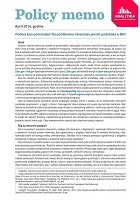Data as Potential: Towards Open Data Policies in BiH
Data as Potential: Towards Open Data Policies in BiH
Author(s): Not Specified Author
Subject(s): Politics, Information Architecture, Governance, Public Administration, Public Law, Corruption - Transparency - Anti-Corruption
Published by: Analitika – Centar za društvena istraživanja
Keywords: BiH; transparency; information access; open data policy; government;
Summary/Abstract: The state and its institutions are the biggest producers, collectors and users of various types of data. Besides personal data, contained in public registers and health records, data of importance to the wider public is also collected, such as data on the state of the environment, economic trends, meteorological and other data. In the past, data of importance to the public was mostly unavailable. In cases where it was available, it was extremely difficult to find and use. Thanks to technological development and the relatively easy and inexpensive opening up of data on the Internet, but also more pronounced public requests for more transparent, accountable and efficient governance, governments worldwide committed to policies of opening data held by public institutions. Examples include websites such as US government’s Data.gov and Usa.gov, or the UK government’s Data.gov.uk and the European Union’s Open Data Portal, all of which provide educational, health, transport, environmental and other data. All of this has led to the rapid growth in use of open public data, in the private and non-government sectors alike. Software applications enable access to data on the Internet or on mobile devices and data is used to improve public services, initiate new commercial projects or enhance transparency of government. Some examples of websites specialized in processing, publishing and further use of open data are OpenSpending.org, which currently holds more than 700 datasets on public spending in 66 countries, or OpenCongress.org which enables monitoring of the work of the US Congress. Although the publication of open public data is a pronounced world trend and the potential of open data has been recognized in the region, such practice has not truly taken hold in Bosnia and Herzegovina. Despite NGO initiatives to open up public data, public institutions, with a few exceptions, mostly do not allow access to data on the Internet or via mobile technology. In order to prevent BiH seriously falling back in the area of proactive disclosure of such data, which would negatively impact all sectors of society, it is necessary to start a wider public discussion on opening up data held by public institutions. This policy memo aims to contribute to such a discussion.
Series: Analitika - Policy Memo
- Page Count: 4
- Publication Year: 2014
- Language: English
- Content File-PDF
- Introduction

